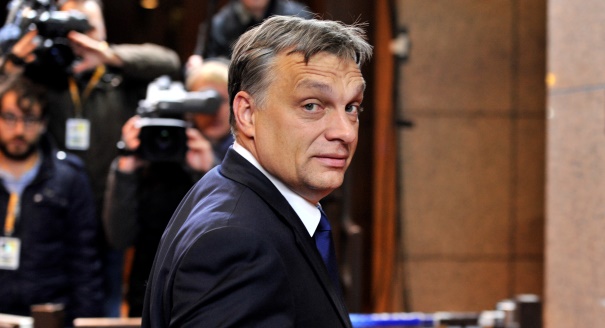Most readers know by now how Hungary’s Prime Minister Viktor Orbán has abused his two-thirds parliamentary majority since his Fidesz party was elected three years ago. He has replaced judges, interfered in the Central Bank and the media, and used his party to monopolize state institutions.
As if these examples were not enough to make the European Commission and the EU member states question Orbán’s democratic credentials, Hungary has now given the EU further cause for concern.
A recent video clip records an extraordinary conversation that took place between Orbán and the major of Budapest, István Tarlós. The occasion was the inauguration earlier this month of a fleet of new Mercedes buses for the Hungarian capital.
Orbán and Tarlós were chatting in a bus that was also packed with journalists, who recorded the dialogue. The conversation received some coverage in the Hungarian press but—so far—has raised no international outcry.
The bus started from Budapest’s Heroes’ Square, slowly making its way along Andrássy Avenue. As it approached the Opera House, the prime minister turned to the mayor and pointed out a palace—the Drechsler Palace, built in 1882 as the home of the Institute of Ballet and now classified as a national heritage site.
Orbán: Hey, István, do these houses still belong to the Ukrainians?
Tarlós: I didn’t even know that they were owned by Ukrainians.
Orbán: I read something about Ukrainians . . .
Tarlós: The Institute of Ballet belongs to the Portuguese.
Orbán: It belongs to a Portuguese individual, and I want it back.
Tarlós: Isn’t there some kind of law that you can’t get it back for twenty years . . . ?
Orbán: Why don’t we create another law? The city could propose it, and I’ll create one.
Tarlós: We need a law for it. A city ordinance is not enough.
Orbán: Initiate the enactment of such a law, and I’ll create one.
Tarlós: Fine with me.
Orbán: Just give me a proposal. I can’t figure it out for you.
Tarlós: Mr. Prime Minister, could we draft a couple of bills?
Orbán: Don’t be too greedy. We are talking about one. You should draft it!
Tarlós: Okay, we will draft one.
The conversation then moves on to how the city could force owners and tenants to refurbish old buildings.
What it shows is Orbán’s blatant disregard for the rule of law and for property rights. His comments about the Drechsler Palace in particular demonstrate his extraordinary confidence in his ability to overturn laws.
After changing hands several times over the past decade, the palace was purchased in 2007 by Aquapura, a Portuguese hotel chain. The Portuguese owners are now considering how to react to this attempt at a property grab by Orbán.
Surely now is the time for the EU to act against an expropriation that is undermining one of the EU’s key principles: the rule of law.
Both the EU institutions and national governments carry responsibility for what happens in the member states. The longer Orbán and his Fidesz party are allowed to get away with their abuse of power, the greater the possibility that like-minded politicians in the region will be tempted to go down the same path—because they know that they will get away with it.
The EU needs to take strong measures to stop that from happening.






